
How do we reach and keep the next generation for Christ? Biblical relational discipleship in the form of discipleship groups is essential. For more on this, read my two new books! Allowing the next generation to follow Christ (and to see what following Christ looks like) with other like-minded students pursuing the Savior cannot be underestimated. Teaching, fellowship, and community were always important to Jesus. But Jesus went beyond formal mentoring when making disciples. In other words, Jesus did not say, “Guys, I’ll meet you at the coffee shop this Friday, talk Scripture and life, and then see you again next Friday.”
Now, there is nothing wrong with meeting the next generation at Starbucks every Friday to study how the Bible meets life. In fact, meeting the next generation at third places such as Starbucks have become standard procedure. ‘Nones’ (the religiously unaffiliated) often opt not to enter through the front doors of a church until they feel comfortable doing so. We could consider ‘nones’ in the coffee shop Bible study as pre-disciples. Jesus didn’t call the pre-disciple fishermen to follow him at church, but rather when they were mending their nets. Do you think these fishermen with the foul mouth of a sailor would have felt comfortable going to church? Now, I know Scripture doesn’t say these men cussed, but men who were out on the open sea two-thousand years ago are the same as men out on the open sea today. I can only imagine the words Peter would have used.
Imagine yourself before you met Christ. I’m sure you felt the same way, that church people would look down on you because you didn’t measure up. To reach the next generation for Christ, we must begin by placing ourselves in their shoes and remembering where we came from. All too often, those who have followed Christ for many years or who have been indoctrinated into the church begin to adopt a “holier than thou” attitude. But once our hearts have been corrected, we can begin to follow the ways of the Master. How did Jesus go beyond formal mentoring with the Twelve? He informally mentored them! He walked with his disciples, living life and applying truth to their world daily. He took everyday life as a practical means of teaching truth. And He expects his followers (that’s you and me) to do the same with others. Yes, we need a mentor, but we also need to be mentoring others.[1] Think Titus 2 where you see older men mentoring younger men and older women mentoring younger women. The next generation desperately seeks mentors to show them how to live for Jesus in the real world. The next generation doesn’t need another Bible study as much as they need to see older men and women living out Bible truths in front of them.
The greatest impact a leader can make is not in the masses to whom he speaks but in the few he mentors. Jesus poured himself into three men: Peter, James, and John. When you’re living life, there are no fronts. People see you for who you are. What are some normal or natural activities that you could begin to bring the next generation along with you on: Running errands, Taking a walk or drive, Cleaning your office, Going to the grocery store, Washing clothes, Preparing dinner, Working on a project, Doing yard work. Informal mentoring is not another item on the to-do list. It’s bringing others along with you for the ride and talking life and godliness with them as you go. Life-on-life discipleship is the superior model for intentionally making disciples. Just remember the mentoring relationship is not about the mentor, but rather Christ. The results speak for themselves: “When they saw the boldness of Peter and John, and perceived that they were uneducated, common men, they were astonished. And they recognized that they had been with Jesus” (Acts 4:13).
[1] Italicized sentences come from the book With: A Practical Guide for Mentoring and Intentional Disciple Making